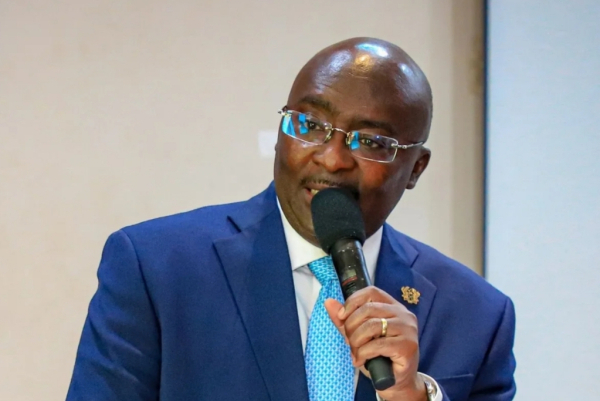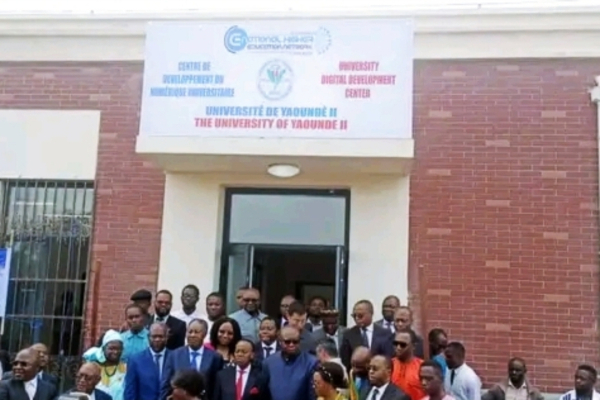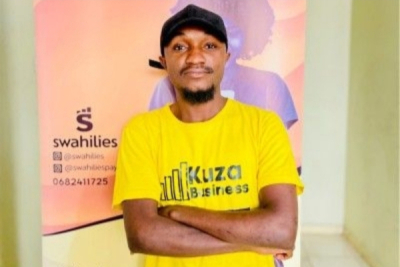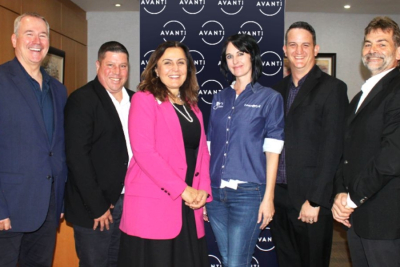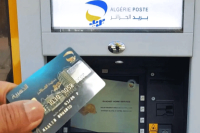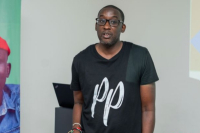The global adoption of blockchain technology is accelerating. Governments around the world are taking notice, exploring its potential to bring greater transparency and efficiency to their operations.
Ghana is poised to become the first African nation to adopt blockchain technology for its government operations, according to Vice-President Mahamudu Bawumia. The announcement was made during the 14th regional conference and annual general meeting of the heads of anti-corruption agencies in the Commonwealth of Africa, held in Accra from May 6 to May 11.
"We are going to adopt blockchain technology for government to ensure that all data and transactions in the Government space are transparent and tamper-proof, no one can change them, and so ours could well become the first blockchain-powered government in Africa," stated Bawumia.
This initiative is part of Ghana's Digitalization Strategy, which has been in place since 2017. The strategy has enabled the government to collect 201 billion GH₵ (approximately $14.2 billion) since 2023 through the digitization of public services via the Ghana.gov platform. Additionally, the new digital ID card has allowed the government to detect 404,707 fictitious names on the payroll of the National Service System and 29,000 phantom pensioners.
By adopting blockchain, Ghana aims to secure government data in a fail-safe manner. According to Bawumia, this technology will serve as a bulwark against corruption by monitoring every modification made to digital data.
Blockchain is an advanced database mechanism that allows for transparent sharing of information across a network. It can be used to record contracts, financial transactions, digital assets, votes, and much more, in a decentralized and secure manner.
Samira Njoya
On Monday, May 13, Jacques Fame Ndongo, the Cameroonian Minister of Higher Education, inaugurated a digital development center at the University of Yaoundé 2 Soa. The center, which can accommodate 40 students, features a smart classroom. It is equipped with cutting-edge technology for digitization and the production of multimedia courses, as well as distance learning.
Driven by the vision of a prosperous digital future for African businesses, he develops customized technological tools that cater to the specific needs of small and medium-sized enterprises.
Tanzanian native John Haule is the founder and CEO of Swahiliesm a startup that develops digital payment solutions for businesses across Africa. Established in 2020, Swahilies provides digital tools designed to empower African businesses by offering sophisticated financial and operational resources. Its mission is to streamline accounting processes, facilitate digital payments, and provide access to banking solutions. The company offers a suite of solutions aimed at helping businesses maintain organization and operate efficiently.
Swahilies has developed a platform that enables businesses to track sales and expenses in real-time, providing them with an accurate understanding of their performance at any given moment. It offers a real-time inventory management system and has created tools to assist businesses in recovering unpaid debts from their customers. Swahilies’ solutions are currently used by over 10,000 businesses in Tanzania.
In addition to his role at Swahilies, Haule is a founding member of the Tanzania Fintech Association (TAFINA), a platform dedicated to bolstering the fintech ecosystem to advance financial and economic inclusion in Tanzania. As the editor-in-chief of the media outlet This Week in Fintech in Africa, he also contributes to the reporting on sector developments.
Prior to Swahilies, Haule founded several other companies. In 2015, he established Positivity Clothing Brand, a clothing brand aimed at inspiring the new generation. The company offered a range of products, including customized t-shirts and caps. In 2016, he co-founded Swahili Inspiration, a digital media platform that uses the Swahili language to inform Tanzanians about global opportunities.
Haule earned a bachelor’s degree in social protection in 2020 from the Institute of Finance Management. From 2021 to 2022, he served as a VC scout, seeking investment opportunities in startups for the investment firm shl.vc.
Melchior Koba
With over 150,000 users in its four years of existence, according to the startup's data, Axa Zara offers several fintech solutions to African populations. The startup aims to become one of the leading players in this segment in Africa.
Zeyow is a fintech solution developed by the Beninese startup Axa Zara, allowing users to create virtual bank cards for conducting online financial transactions. Founded in 2019 by Elias Mahugnon Missihoun, the startup operates out of Abomey-Calavi (Benin) and Abidjan (Côte d'Ivoire).
“Axa Zara’s mission is to create infinite opportunities through technology. By leveraging the potential of technology, our goal is to provide access to new possibilities, break down barriers, and enable people from all walks of life to achieve their professional goals,” the startup explained to We Are Tech Africa. It continued, “We focus on developing digital solutions that are not only effective but also inclusive, ensuring that no one is left behind in the digital revolution.”
Zeyow does not have a mobile app. Users must access the service through a web browser by visiting the Axa Zara website. To use Zeyow, users click on “create an account” and provide information such as name, email address, and phone number.
After this step, users can create their virtual bank card and perform online operations like shopping on e-commerce platforms or subscribing to services. The card can be recharged using various methods, including mobile money, which is popular among African populations.
Talking about its continental expansion plans, Axa Zara says: “We are actively looking to expand into other countries. This process involves a rigorous market analysis to pinpoint exactly where the needs lie. We consider the local ecosystem and all available opportunities to ensure that our intervention is not only relevant but also beneficial to the communities we aim to serve.”
Adoni Conrad Quenum
Two months ago, about ten Central and West African countries experienced an internet disruption for several days. The inconvenience has occurred again.
Internet services have been disrupted in several East African countries since Sunday, May 12. NetBlocks, a British organization that monitors internet restrictions worldwide, attributes the incident to failures in the SEACOM and EASSY submarine cable systems serving the region. According to NetBlocks, the disruptions impact millions of users, including in Tanzania, Mozambique, Malawi, Burundi, Rwanda, Madagascar, Comoros, Uganda, Somalia, and Kenya. Sierra Leone, a West African country, is also slightly affected by these disruptions.
This marks the second occurrence this year of internet disruptions in Africa due to incidents involving submarine cables that serve the continent. In March, similar outages affected the WACS, MainOne, ACE, SAT3, Seacom/TGN, AAE1, and EIG cables, impacting a number of West, Central, and Southern African countries. Some of these cables have yet to be repaired.
In the affected countries, efforts are underway to address the situation, involving both telecom operators and Internet service providers, as well as public authorities. Nape Moses Nnauye, the Tanzanian Minister of ICT, stated, “There are ongoing efforts to solve the problem. As they continue to solve the problem, we will have very low access to internet and international voice calls.”
Isaac K. Kassouwi
In today’s rapidly evolving digital landscape, initiatives that transcend connectivity barriers are pivotal. They equip businesses to thrive in a competitive global arena. By enhancing connectivity, these efforts not only streamline operations but also catalyze the adoption of cutting-edge technologies. The expansion of markets, as a result, leads to a robust economic upturn and the creation of new job opportunities, marking a significant stride in collective progress.
Avanti Communications has partnered with Q-KON to introduce Low-Earth-Orbit (LEO) satellite services in South Africa. The leading global multi-orbit satellite technology provider announced this in a tweet posted today May 13.
Kyle Whitehill, CEO of Avanti Communications emphasizes the partnership's strategic significance, catering to diverse customer needs and giving “our customers in South Africa the assurance that all their unique problems can be solved through our services. This is particularly important for our enterprise customers in South Africa where the need for resilience is key.”
This partnership addresses regional connectivity obstacles by harnessing Q-KON's Eutelsat OneWeb service, powered by its advanced Smart Satellite Service technologies. By integrating LEO services with existing GEO offerings, the alliance enhances Avanti's multi-orbit solution. The introduction of LEO connectivity holds the promise of improved solutions for South African businesses, highlighting a shared dedication to innovation and customer-centricity.
Space in Africa released a report in 2022 delving into the hurdles Africa encounters in connecting its population to the internet. Titled "The State and Future of LEO Satellite Internet Connectivity in Africa," the report identifies poor infrastructure, affordability issues, and a perception that some areas are not ready for internet access. Nonetheless, cooperative endeavors are starting to reshape the continent's internet landscape. Additionally, the report references MIT research indicating that due to limitations with terrestrial systems, satellites are poised to significantly increase connectivity across Africa in the next five years.
Hikmatu Bilali
On Thursday, May 9, Algerian Minister of Post and Telecommunications, Karim Bibi Triki, announced the upcoming installation of 1,000 new automated teller machines (ATMs) by Algérie Poste across the country. This initiative aims to meet the increasing demand for banking and financial services. It will help facilitate daily life for citizens, especially in areas where access to traditional banks is limited.
With several years of experience gained from Senegalese and European companies, he has ventured into the education sector, using technology to assist schoolchildren.
Senegalese Entrpreneur Mafal Lô Absa is the co-founder of Génimi, a startup that streamlines tutoring to aid students in Francophone Africa. Established in 2022, Génimi is a mobile platform that makes learning an enjoyable experience for children, parents, and tutors alike. Its mission is to nurture each child’s potential by teaching them how to learn and instilling a lifelong passion for learning.
Génimi is designed to support elementary students who are struggling with mathematics and reading by identifying their challenges and connecting them with local coaches to help them excel. Besides facilitating diagnosis, the app provides a program to address children’s learning gaps, guides coaches, and generates engaging exercises that children can tackle independently. To date, the app, in collaboration with three schools, has served 1,488 students and trained 38 coaches.
Mafal Lô Absa also serves as the president of CJD Senegal, the national chapter of an international non-profit organization of young leaders and business executives dedicated to fostering entrepreneurship and enhancing the overall performance of businesses and entrepreneurs.
In 2015, he founded FIREFLY Media Senegal, a platform that enables businesses and brands to better understand and engage their target audiences. In 2019, he co-founded PitchPalabre, a company focused on enhancing the capacities of young entrepreneurs.
Mafal Lô Absa earned a degree in systems, networks, and telecommunications engineering in 2004 from Ingésup, a computer engineering school. He also holds a master’s degree in market finance, which he received in 2007 from the Conservatoire National des Arts et Métiers.
With a diverse professional background, he has worked as a business and IT analyst at SIX Telekurs, a Swiss company providing services in the securities, financial information, and payments sectors. He has also held positions as a business analyst at BNP Paribas and Dexia Asset Management, a European asset management company.
Melchior Koba
To make learning more accessible and engaging, two Senegalese tech entrepreneurs launched a new e-learning platform aimed at students from middle school through senior high school. The platform has already secured partnerships with several Senegalese schools.
20/20 Edtech, an e-learning solution developped by a Senegalese startup, provides users with a wealth of educational content accessible via web and mobile platforms at their fingertips. The startup, headquartered in Dakar, was established in 2020 by Abderrahmane Sow and Ahmadou Ba. Its mission is to build a library of cost-effective educational content for students in Francophone Africa.
The startup explains, “By utilizing the 20sur20 platform, students can learn through hundreds of concise, straightforward, and highly engaging videos that enable them to review at their own pace, practice continuously by answering our quiz questions that ensure comprehension of the material, and improve by pinpointing their knowledge gaps and focusing their learning efforts accordingly.”
The solution includes a mobile app, which is exclusively available on Android and not on the Play Store. Users must navigate to the web platform to download the app and register an account by providing their personal information. Once registered, users can access a range of edtech content, from sixth grade to senior high school. Currently, only the content for sixth grade, ninth grade, and twelfth grade is available on 20/20 Edtech.
In addition to a variety of courses, quizzes are provided to enable users to gauge their proficiency levels. An analytical dashboard offers real-time performance visualization, identifies areas of weakness, and automatically addresses them with the platform’s content. The objective is to generate 1,500 videos and 50,000 quizzes across seven subjects (including mathematics, physics-chemistry, life, and earth sciences, philosophy, etc.) for secondary school classes. The aim of 20/20 Edtech is to simplify studies for students at the various levels mentioned.
Adoni Conrad Quenum
He is a dedicated entrepreneur who devotes his life to creating technological solutions aimed at improving the efficiency of small and medium-sized enterprises in Africa. His commitment to entrepreneurship and his innovative spirit have earned him several awards.
Ivorian tech entrepreneur Alex Degny (photo) is the co-founder and CEO of Tajiri, a startup established in 2023 to transform the restaurant management landscape in Côte d'Ivoire and throughout Africa. The company offers a mobile app, compatible with Android and iOS, that simplifies the lives of restaurateurs by providing a platform to log sales, monitor business data, and even secure financing. Its app streamlines order taking and tracking, and facilitates the monitoring and management of inventory for optimal planning.
In addition, Tajiri provides analytical reports that enable performance assessment and data-driven decision-making. It enhances operational efficiency in restaurants by improving communication between the dining area and the kitchen.
As of April 12, 2024, Alex Degny took on the role of president of #Ci20 (Côte d’Ivoire Innovation 20), a coalition of tech companies, succeeding Steven Bedi.
Prior to launching Tajiri, In 2017, Degny founded Innoving, a startup that offers management software to small and medium-sized enterprises. Then, in January 2018, he established RIZE’S, a French startup specializing in digital services.
Degny is a graduate of the Catholic University of West Africa, where he earned a master’s degree in banking, business, finance, and real estate law in 2008. He also holds a certificate in business administration and management from HEC Paris.
Degny embarked on his professional journey in 2011 at FIAO Côte d'Ivoire (West African Investment Finance), serving as the head of the executive office. In 2014, he transitioned to the role of sales manager at WABCO COTIA, a company that specializes in the production and marketing of compound fertilizers. In 2015, he served as an administrative consultant for the rice company GAN Logis. By 2016, he had become the general manager of Agri Hope, a consortium of several companies specializing in agribusiness.
In recognition of his contributions to the fields of technology and entrepreneurship in Africa, Degny was awarded the innovation prize at season 5 of Orange Fab Côte d'Ivoire in 2019.
Melchior Koba
More...
Burkina Faso, like many other African countries, is currently working on digitizing services for citizens. The executive's goal is to fully digitize administrative procedures by 2025.
Burkina Faso's public administration is poised for a digital overhaul, with the Council of Ministers approving a decree on Wednesday to streamline the deployment of robust information systems and high-quality digital platforms.
This initiative, championed by Digital Transition Minister Aminata Zerbo/Sabane, targets a more efficient and effective public service. The decree aims to reduce processing times, facilitate citizen access to services, and ultimately deliver user-friendly, high-quality platforms.
The new measures address longstanding issues that have hampered past digitization efforts, including inadequate pre-launch testing, platform incompatibility, and poor communication between government departments.
This aligns with the National Strategy for the Modernization of Public Administration (SNMAP) 2021-2025, which envisions a model public administration by 2025, underpinned by republican values and focused on serving citizens.
An evaluation by the Ministry of Digital Transition in February revealed that, as of then, 83.97% of administrative procedures were undergoing digitization. The new decree is expected to tighten management of platform rollouts, ensuring the quality of e-services, user data protection, and ultimately, a more secure and efficient public administration.
Samira Njoya
French telecoms group Orange is active in several sectors in Africa. It has decided to enter the cybersecurity sector in the Democratic Republic of Congo with the assistance of its local subsidiary.
Orange RDC, the Democratic Republic of Congo (DRC) subsidiary of French telecoms giant Orange, and Orange Cyberdefense, the group's dedicated cybersecurity unit, signed a partnership agreement on Thursday to enhance cybersecurity in the central African nation.
Under that agreement, Orange Cyberdefense is rolling out three services: “Microsoc” for securing various computer networks nationwide, “Penetration Testing” for vulnerability detection, and “Cyber Diag” for evaluating an organization’s cyber resilience and suggesting solutions in the event of security breaches.
The partnership comes amidst Africa's rapid digital transformation, where cybersecurity has become a crucial consideration. The International Telecommunication Union's 2020 "Global Cybersecurity Index" ranked the DRC 40th on the continent, surpassing only the Central African Republic but lagging behind South Sudan. SInce then, the DRC has made strides under President Félix Tshisekedi's leadership. Notably, the country ratified the African Union (AU) convention on cybersecurity and personal data protection in April 2023.
Africa’s cyberspace as a whole is vulnerable, according to a June 2023 Kearney report titled "Cybersecurity in Africa: Call to Action." “Africa’s cyber resilience is low, particularly around strategy, governance and operational entities and cross-sector cooperation,” the report finds.
Adoni Conrad Quenum
A computer scientist by training, he believes in the potential of e-commerce in Africa. He develops technological solutions to help e-merchants grow their businesses.
Youssef Akalal (photo), a Moroccan computer scientist and entrepreneur, is the co-founder and CEO of Dropify, a platform that empowers e-merchants to establish online stores and sell their products. Founded in 2022, Dropify offers a seamless and free process for creating virtual shops and sales funnels. The platform's intuitive tools and variety of templates aim to provide an optimal user experience, ultimately assisting merchants in achieving their growth objectives. The created stores are equipped with a comprehensive dashboard to manage their content efficiently.
In addition to his role at Dropify, Akalal is also the co-founder and CEO of COD Partner, a company launched in 2022. COD Partner collaborates with online vendors by providing a complete logistics platform, thereby facilitating their access to multiple international markets.
Akalal's educational background includes a master's degree in Systems Architecture from the National School of Electricity and Mechanics (ENSEM), which he earned in 2010. He also holds a master's degree in Information Science and Technology from the University of Quebec in Outaouais, obtained in 2019.
His professional career began in 2007 at BNP Paribas, where he worked as an IT operations pilot. In 2008, he joined Akka Technologies as a quality assurance team leader and was promoted to technical team leader in 2009. Between 2016 and 2022, he worked for IFS North America, a company specializing in enterprise software. During his tenure, he held the positions of Business Intelligence (BI) Analyst and Data & BI Architect successively.
Melchior Koba
Morocco is firmly committed to digital transformation. Recognizing that human resources are the cornerstone of this endeavor, the country is implementing initiatives to modernize educational programs by integrating digital skills from an early age.
The University of Moulay Ismail signed a partnership agreement with Cisco Network Academy, a global online learning platform offered by American technology giant Cisco Systems, on Wednesday, May 8.
This collaboration, established during a visit by a Cisco Network Academy delegation to Morocco, is designed to equip students and faculty with in-demand digital skills in critical areas like computer networking, artificial intelligence, programmable infrastructure, and cybersecurity.
The initiative aligns perfectly with Morocco's "Pacte Esri 2030," the National Plan for Accelerating the Transformation of the Higher Education, Scientific Research, and Innovation Ecosystem by 2030. This strategic plan emphasizes preparing students with the necessary personal, cross-disciplinary, and digital skills to meet the evolving demands of the job market, reflecting both royal directives and the global digital revolution.
The partnership builds upon a tripartite agreement signed last December between the Moroccan Ministry of Higher Education, the Ministry of Digital Transition and Administrative Reform, and Cisco.
Furthermore, this new collaboration aims to strengthen the training and certification programs offered through the "Centres code 212" hosted by Moroccan universities. Students and teachers will gain free, unlimited access to Cisco's partner training programs, along with support in preparing for industry-recognized certifications.
By prioritizing youth training and upskilling the population in digital capabilities, Morocco seeks to cultivate a robust pool of graduates equipped with specialized knowledge in innovative fields. This initiative aims to accelerate the nation's digital transformation journey and position Morocco as an attractive destination for both domestic and international investors.
Samira Njoya


